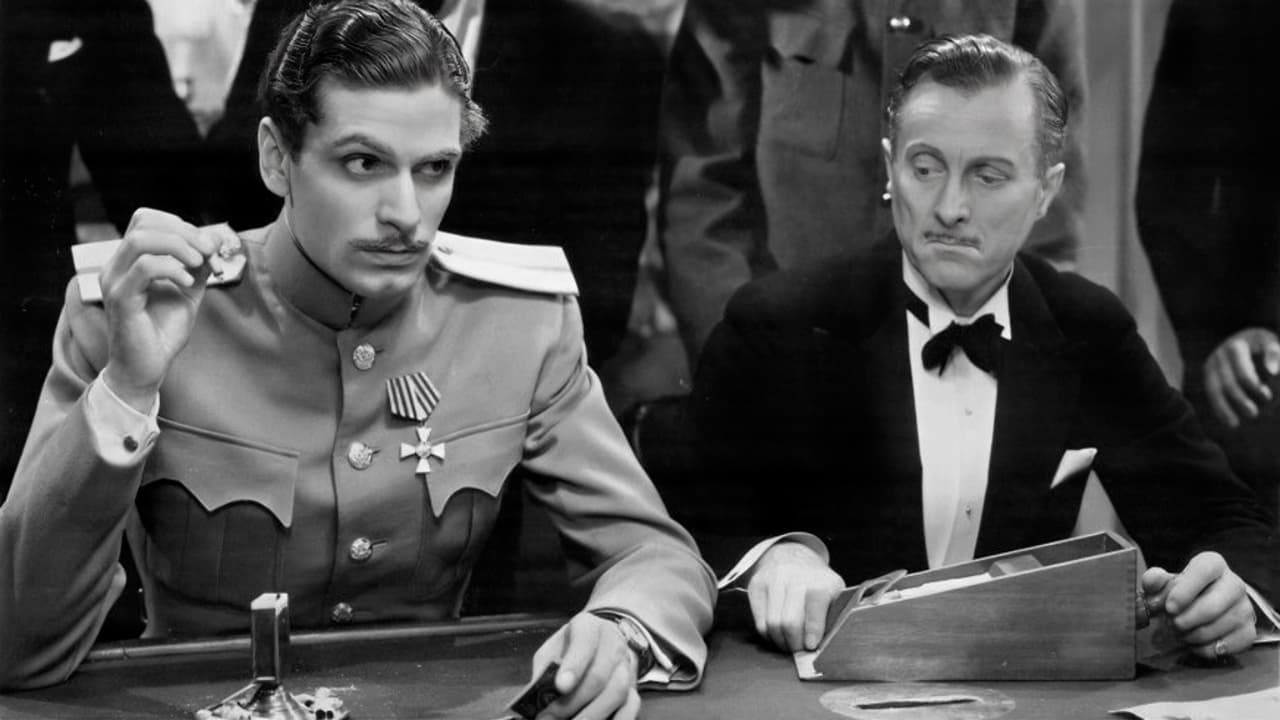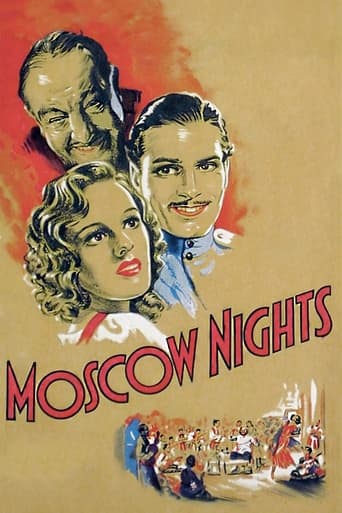AboveDeepBuggy
Some things I liked some I did not.
Tedfoldol
everything you have heard about this movie is true.
Breakinger
A Brilliant Conflict
Phillipa
Strong acting helps the film overcome an uncertain premise and create characters that hold our attention absolutely.
GusF
Based on the 1929 novel "Les nuits moscovites" by Pierre Benoît, this is an engrossing romantic thriller. The film takes place in the dying days of Tsarist Russia in 1916, by which time the First World War was going very badly for the country. This was the second adaptation of the novel after a French film released the previous year which, unsurprisingly, retained the original version of the title. It belongs to the World War I spy film genre, which was quite popular in Britain in the 1930s. In such films, the German Empire was often used as an allegory for Nazi Germany. Benoît would probably not have approved of this interpretation as he later collaborated with the Nazis during the occupation of France. The film has a strong script by Anthony Asquith and Erich Seipmann and the former directed it very well, maintaining a rather high level of tension for much of its 70 minute running time.The film stars Laurence Olivier in a typically excellent performance as the charming, dashing cad Captain Ivan Ignatoff. Had this been followed by a Hollywood remake in the next few years, I think that the role would have probably been played by Errol Flynn, Don Ameche or Tyrone Power. Having injured his leg in battle, Ignatoff is sent to a military hospital behind the lines where he falls in love with his 19-year- old nurse Natasha Kovrin, played very well by the enchanting Penelope Dudley-Ward who unfortunately made only eleven films before her retirement in 1944. As in their later film "The Demi-Paradise", their chemistry is top notch. It soon becomes clear that Natasha returns Ignatoff's feelings but she cannot act on them as she has a fiancé: a boorish, slovenly industrialist about 20 years her senior named Peter Brioukow who is making a pretty ruble from the war. Her domineering mother pressurised her into accepting his romantic overtures so that they can both continue to live in the manner to which they had become accustomed after her father's death. Harry Baur, who reprised his role from the French version, gives a wonderful performance as Brioukow. He is suitably vile for much of the film but the character is not entirely one note. In stark contrast to Benoît, Baur was tortured by the Gestapo in 1943 and died of his severe wounds shortly afterwards. He was captured while attempting to rescue his Jewish wife Rose from their clutches. The rather less heroic Brioukow becomes convinced that there is something going on between Natasha and Ignatoff but she has remained faithful to him even though she is not preparing for her nuptials with unbridled glee. Ignatoff makes the serious mistake of gambling with Brioukow and ends up owing him 80,000 rubles. With only three days to pay, he believes that he may have no option but to settle his debts by killing himself. However, he is offered a way out by Madame Anne Sabline. Athene Seyler, who lived to be 101 on the bright side, is fantastic as Madame Sabline, who is in actuality the German spy Anne Steinbeck. She is an extremely shrewd, manipulative woman who always thinks several moves ahead. However, the fact that she plays the role of a kind-hearted but not very bright one very well means that no one suspects her of being a senior figure in the spy ring that is seemingly making significant inroads into Mother Russia. Everyone simply takes her at face value. In exchange for money, Madame Sabline attempts to recruit Ignatoff, who has been given a desk job at the Ministry of Supplies before he is fit enough to return to the front, into her organisation. Ignatoff's not the luckiest chap in the world, I'm afraid. The only other major cast member who stood out was Morton Selten as Natasha's kindly uncle General Nicholas Kovrin, the head of the counterintelligence agency Section C. The film is also notable for featuring the film debut of a very young and uncredited Anthony Quayle as a wounded soldier named Vanya.Overall, this is an extremely enjoyable film which admirably succeeds in both its romantic elements and its spy film ones.
seglora
This early Asquith film is set in Imperial Russia during World War I. Olivier plays a Russian officer (Ignatoff) who is recuperating in a military hospital, where he is looked after by a nurse, Natasha (Dudley-Ward). She is already engaged to Brioukow, a rich merchant of peasant stock, played by Harry Baur. This is a sentimental wartime drama with an interwoven minor spy plot. Its main interest lies in Olivier's performance .He was to repeat a Russian role but now with heavy Russian accent in "The Demi-Paradise" (1943), also made by Asquith. Harry Baur was a great French actor who starred in many films by some of the most famous directors before World War II. He was tortured to death by the Gestapo in 1943. He was most excellent in "Poil de carotte" (1932), Julien Duvivier's masterpiece. In this film, however, he is prone to a certain overacting and he is not helped by having been dressed up to look like Rasputin, although he is not really villainous in this role. Film buffs will be interested to note that there is an uncredited short appearance by Anthony Quayle in his debut on the silver screen.
mark.waltz
The love between a Russian captain (Laurence Olivier) and a member of the Russian upperclass (Penelope Ward) leads to trouble due to her family's instance that she marry a wealthy trader (Harry Baur) and Olivier's manipulation by a seemingly sweet old lady (Athene Seyler) into trying to get military secrets. He is accused of being a spy and only Baur's testimony can save him. Will the jealous older man follow his conscience and tell the truth about how Olivier's gambling debts were really paid or will he sacrifice his own honor so he can win the pretty Ward who doesn't love him? Somewhat creaky and obviously made on a very low budget, this has some interesting twists and turns along the way, the most impressive of which has an emotional outburst by one of the main characters and the sudden switch to an explosion during a battle. Set during the post-Russian Revolution, this seems to be indicating that the remaining Russian aristocracy will do whatever it can to maintain its status as the Bolsheviks take over and that Seyler (resembling Granny from the "Sylvester/Tweety Bird" cartoons) will use whatever means she can to undermine the peasant rebels who have interrupted centuries of tradition.In spite of a gripping story (which includes Baur's vision of what would happen should he testify against Olivier), the film is mangled by poor filming and some poor acting. Olivier's accent seems to go in and out (although he would perfect his accents in later films as his acting improved), and Baur overacts to the point of seeming like the French version of Tod Slaughter. There are a few intense moments set in a gambling casino where the animosity between the two men reaches a frenzied battle of one-upmanship. Seyler steals every moment she is on screen, but don't most cute old ladies with hidden agendas? Ward makes an appealing heroine, but unfortunately, she's paired with two men who had different ideas of how to make their characters more interesting, which works only on the case that the audience is snickering at them more than taking them seriously.
Merle Peirce
Moscow Nights is not a superb film, but it is studded with so many jewels and excellences that one feels guilty criticising it. Probably the worst that one can say is that Penelope Dudley-Ward, no matter how hard she tries, always looks like she should be at Croydon, waiting to board a Hanley-Paige for India, not playing a nurse named Natasha.The plot is sometimes a bit thin, and one cannot help but wonder why the film was set in Russia. Still, it seems one of the wave of espionage films that confronted British audiences following Hitler's accession in 1933.The appearance of Anthony Quayle adds interest, and Harry Bauer does a very creditable job as the film's villain. Olivier is brilliant as the young officer, who, although the hero, is something of a cad - in contradistinction to Bauer's character, who though a boor, is also something of a hero. There are wonderful settings, views and scenes that clearly show Asquith's grasp of Hollywood technique. In many ways, it is more Hollywood than Hollywood.Is Miss Kovrin a presentiment of Miss Froy in Hitchcock's The Lady Vanishes?

